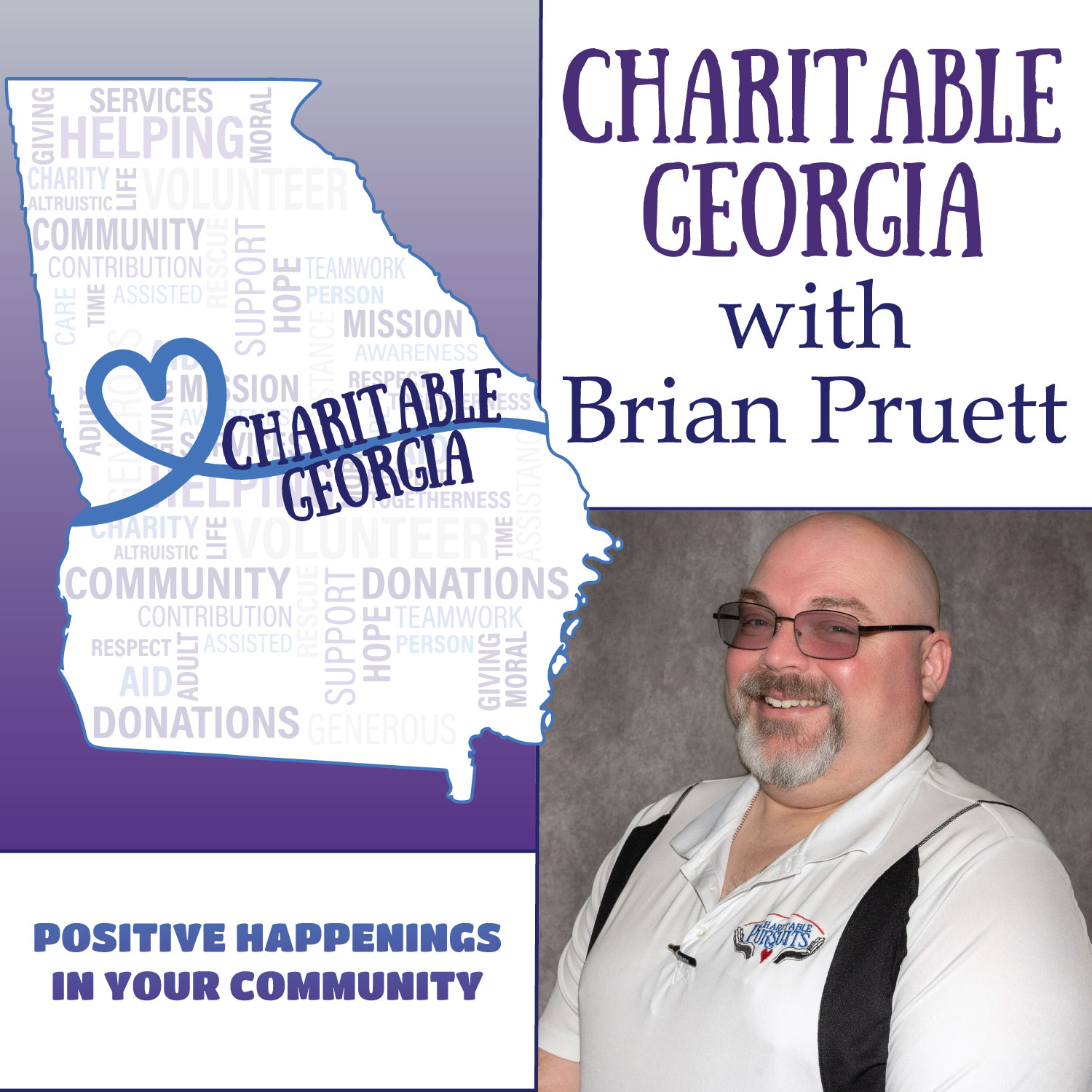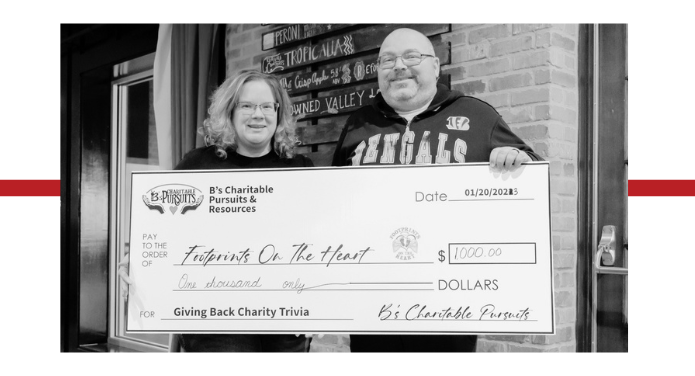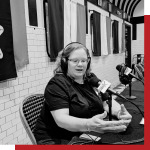

 Khristie Staines is a native of Bartow County (Georgia), a graduate of Cass High School as well as Shorter University. She has been married to her husband Michael for 15 years and is the mother to Trevor, stepmother to Allison, and grandmother to Maddox and Natalie (in Heaven).
Khristie Staines is a native of Bartow County (Georgia), a graduate of Cass High School as well as Shorter University. She has been married to her husband Michael for 15 years and is the mother to Trevor, stepmother to Allison, and grandmother to Maddox and Natalie (in Heaven).
She is the co-founder of Footprints on the Heart. Natalie was delivered stillborn in 2011 and God laid on her heart that night to create a resource for bereaved families. After discussing this with her cousin, Lori Dowdy (who had suffered a miscarriage 5 years prior), Footprints on the Heart was created.
They offer free in-person services (Remembrance Photography • Memory Making • H.OP.E. Boxes • Assistance with Funeral Planning • Ongoing Peer Support) to families facing pregnancy and infant loss (up to age 2) in Bartow County (GA) and its surrounding counties.
They also host/participate in various Community Outreach/Events throughout the year. Footprints on the Heart is a registered 501(c)3 non-profit organization and they can be reached at info@footprintsontheheart.org. Find them online at footprintsontheheart.org or www.Facebook.com/footprintsontheheart.ga
This transcript is machine transcribed by Sonix
TRANSCRIPT
Intro: [00:00:07] Broadcasting live from the Business RadioX studios in Atlanta. It’s time for Charitable Georgia, brought to you by B’s Charitable Pursuits and Resources. We put the fun in fundraising. For more information, go to B’s Charitable Pursuits dot com. That’s b e. S charitable pursuits dot com. Now here’s your host, Brian Prewitt.
Stone Payton: [00:00:45] All right. We’re going to do a little bit of a head fake because I am not Brian Pruett. This is Stone Payton with Business RadioX. Welcome to this very special edition of Charitable Georgia. We are actually on site at one of those fund raising events. Stone Payton here again with you and I am with Khristie Staines with Footprints on the Heart. Welcome back to the business radio microphone. What a delight to have you. What brings you here tonight?
Khristie Staines: [00:01:12] First of all, thanks so much, Stone, for being here and broadcasting live with us. We’re super excited for this first charity trivia giveback. Not that Brian and his team have put together. We’re so grateful for all of the sponsors for making tonight happen. It’s already a little busy out there. The buffet looks great. I’m not sure I’m going to know the trivia answers, but I’m definitely going to eat. Good.
Stone Payton: [00:01:36] Hey, it’s crazy out there. I’m surprised I was able to pull you away from the buffet line. I’m going to hear it here in a little bit. Tell me a little bit about your expectations, what you’re hoping to achieve by being here and hanging out with. What I can only characterize, I guess, is like minded people. These are these are folks who genuinely want to serve and are very serious and committed to these various causes that we’re trying to help out.
Khristie Staines: [00:02:00] Yes. I’m so thankful once again to all the sponsors, very thankful to the Carnival Business Club. I go each week and network with those and and they’ve really turned out and supported this event just like they did back with our Christmas project for the nurses. And honestly, every event doesn’t matter if it raises a dollar or $1,000. It’s just raising awareness, raising education to remind people that infant loss does occur. It’s occurring in all of our communities. It’s just such a taboo topic that people don’t discuss it, and we just want to let people know who we are and what we offer the communities we serve.
Stone Payton: [00:02:37] Yeah, so say a little bit more about the work, but before you do, I’ll share something with you that I did not share with you when you were in our studio. My wife Holly and I, about 32 years ago, had a baby boy that lived for about a day. And so although I chose not to share during that particular episode, I was more my role was more producer. I do have a little bit of a feeling for what people go through and just God bless you and your work.
Khristie Staines: [00:03:08] Thank you. And and I don’t know what memories you might have had that were made. And what was your son’s name? Jesse. Jesse, I don’t know. 32 years ago, people didn’t do probably what we do today. And so, you know, you and your wife may have had lots of memories, tangible memories with your baby boy. You might have had none, you know, depending on what gestation you were, what gestation. So full term.
Stone Payton: [00:03:31] Full term. And that was very early in the technology of the echo machine. It did not do the trick. And, you know, we told ourselves that he was in a better place. And we were told not long after that that a that an experience like that often will either break a couple apart or really bring them together. And we’re so blessed and so fortunate. I really do think it made us stronger and brought us closer together. And that’s not to suggest for one moment that it wasn’t difficult. One of the challenges that we experienced and then we’ll quit talking about me, we processed and I suppose we still would our grief very differently, and learning to navigate that.
Khristie Staines: [00:04:14] Was definitely processed differently. And going back to like finding out his age because that determines what tangible memories might have been made. So you might have got hand or footprints or ink prints. And then again, 32 years ago, you know, it’s not been that long ago. Mamas didn’t even get to see their babies. Oftentimes when a loss occurred or if you go back a little bit further, the dads would take care of all the arrangements before mom ever left the hospital. And mom didn’t even get to go to the funeral a lot of times. So for us, we just try to slow that process down, help them get past the fear of the unknown, because the outside world is, I refer to. It may think everything we do is crazy, but when you’re in that moment and those tangible memories are what you have to last forever because you know, you’re 32 years into that journey. I’m a bereaved grandmother. 11 years into that journey, there’s things I’ll never forget and there’s things I can’t remember no matter what. From that experience. Natalie Her birthday would be coming up on February the ninth. And so, you know, I tell couples, just like you said, it’ll pull you together. You know, it’ll bring you together or tear you apart. And there is no middle ground for that, it seems, from from walking alongside families. And that’s why we encourage families to grieve together, because men and women definitely one dad explained it to me that men did not like chaos in their brain. So they want to process and get done and they’re going to throw themselves into work and being busy and those things where a woman sometimes is going to. Think about it. Talk about it and work through it in that way.
Khristie Staines: [00:05:46] So then, you know, I’m faith based, so we know the devil is going to step in and make the mom think the dad doesn’t care and make the dad think the mom is studying on it too much or, you know, grieving too long. I don’t know that too long is the right word because, you know, half your heart’s missing forever. There’s no such thing as too long. But I think the devil will use that to get in and tear those families apart. Because, you know, his. His thing is to kill still and destroy. And he stops at nothing for that sometimes. So we you know, we recently found a book that we love that talks exactly about that based on the five love languages book and theory. I’ve heard of that book, and it’s a book that specific written for families who lose a baby. And so for them to have that book, to help them navigate and see, just like you were talking about, where women and men do grieve so differently, it helps them know that what they’re experiencing and feeling may be normal because their friends and family and loved ones may mean well. But if they’ve not been in those shoes, they may not know what it’s really like. I don’t know if y’all had a close support system. Some of our families have an amazing support system. Some of our families walk the journey alone with no family friend type support system. And obviously we’re there to provide peer support. But, you know, we’ve we’ve had some heartbreaking situations that we’ve served in, and you just want to love them up and wrap them up in your family because they don’t have what you have.
Stone Payton: [00:07:14] So the work, I’m sure it must be absolutely fraught with challenges and it’s got to be emotionally draining. And at the same time, I got to believe there are aspects of it that you find very rewarding.
Khristie Staines: [00:07:27] Yeah, I tell people all the time, you know, it’s sacred ground to stand in that hospital room or, you know, maybe we didn’t find out about their loss when they were at the hospital. Maybe we’re serving in the funeral home capacity. Maybe we’re serving 32 years down the road when we meet them and talk to them on a day like today, I tell people, if you step back and look, even amidst the most tragic of situations, if you look, you might not can look on day one. But if you look back, you can see that even though God may not have answered your your prayer for a healing for Jesse or any other family, he entered in an ultimate healing way. It just might not have been the way we believe that he should have answered. But we have to believe that even despite that, there’s a lot of really good things that he may have put into place. Maybe he put the perfect nurse in your room. Maybe he put the funeral home like we are so, so blessed to have funeral homes that donate their services for our families. I think last year we served 62 families roughly in person, and I think around 40 of those families at least, and possibly more receive their funeral services for their babies at no cost to them.
Khristie Staines: [00:08:33] Wow. That’s like 25, 30,000 probably in donated services. So maybe it’s just them putting that funeral home in their community that’s willing to do that. Maybe it’s a ministry like ours. Maybe it’s their friends and loved ones. You know, we had a family we served. It’s going to be a year ago coming up that literally we helped them set up a meal train and we did it for for grass cutting and for groceries and for accepted monetary gift cards. That family, I think, did not have to worry about cooking a meal for almost a month straight. They didn’t have to worry about what was for breakfast, lunch or dinner because somebody signed up to make sure that every couple of days they were taken care of and they didn’t know that dad didn’t have to cut his grass, all the whole grass cutting season almost, because his friends stepped in because, you know, with with men it’s different. And I tell people, don’t be afraid to let others love on you because they don’t know how to fix it and make it better. So let them just be like your mama and let them love on you, because really that community is what gets you through.
Stone Payton: [00:09:36] So how are you funded and what can we and by we, I mean the community and Bartow, Cherokee, Cobb County, surrounding communities and the business community. What can we do to help?
Khristie Staines: [00:09:49] So right now, our ministry, you know, just being real and honest, we’re probably 95% funded by Facebook donations, those five and $10 donations. Wow. $20 donations really make a huge impact. We’ve been blessed in the past to receive the Cartersville service Lake Grant, which is local to Bartow County. They are a nonprofit that fundraises all year long and then turns around and give gives that money back to the Bartow County community nonprofits. We’ve been blessed for that. Last year we were blessed to be the recipient of a grounds for hope, grant opportunity, and hopefully we’ll get to apply for that again this year as well. So, you know, we don’t get government funding, we don’t get county funding, we don’t get hospital funding. Truly, it’s the families we served, our friends, our loved ones, strangers. You know, on Facebook, we had someone from London that found us in little old Kingston, Cartersville, Georgia. Yeah. And did a fundraiser. So a lot of times it’s people that really don’t even know who we are and what we do other than what they see shared on social media, which really isn’t even a drop in the bucket of what we do because we are very private in a lot of that. The families know what we do, the nurses know, but the outside world, because you know, it is their most sacred. You’ve been there. It’s a very intimate time. And so we try to make sure to respect that. Yes, we have to share who we are and what we do. And it’s a hard balance for sharing images of what we do and and protecting the family’s privacy. Some families, we have permission to share anything picture wise we may have taken. But even still, that doesn’t mean that we’re just out there sharing it away either. Because, you know, I know being a grandmother, how sacred those images that are in that true, raw moment of grief can be.
Stone Payton: [00:11:37] Oh, yeah. So you mentioned a moment ago the Cartersville Business Club. I’ve heard such wonderful things about this group. Can you speak to that a little bit before we wrap?
Khristie Staines: [00:11:47] Yes, We meet each week on Wednesday here in Cartersville, Georgia, and it really is a great time of networking with one another. I just can’t say enough. It’s definitely not my wheelhouse because I’m a little nervous. Each week, Brian tells me, you know, I’m like, Dory, just keep on swimming. I think it is. Dorie Maybe so I just keep coming and trying and they’ve been really great to embrace us in what we do and other businesses and nonprofits too, as well. I’ll never forget, you know, when you stand up and tell like, you know, what’s a perfect referral? And I’m like, in the beginning I was like, well, a perfect referral. Like, we only get called when there’s a trauma. So I didn’t even think about, oh, a perfect referral is a photographer that wants to lend their time. It’s a business that might want to sponsor us. It’s a person like Brian that might want to do a fundraiser. So it opened my eyes to what I needed to be thinking of instead of, in my mind, thinking, Oh, we don’t want anybody to really need us because that means a sad tragedy took place.
Stone Payton: [00:12:46] Yeah. All right. Where can people get in touch with you if they just want to learn more about this, how they might support you or if, you know, if they need the help and they find themselves in this situation or intimately connected to a similar situation, what’s the best way to to connect with you and learn more?
Khristie Staines: [00:13:05] So we have a website Footprints on the Heart dot org, but we are probably most active on our Facebook page. Messages come straight to me. We don’t have an outside group that that does all the admin stuff. It’s pretty much it comes straight to me. So if you message the page, I’m going to have that message pretty quick and try to reply back. There’s stories and different things on our Facebook. Our events are there. We have an annual candle lighting in October every year. That’s one of our most special and sacred nights of the year because we sometimes see the families for the first time after being in that sacred ground.
Stone Payton: [00:13:41] Well, Kristy, thank you so much for what you and your team are doing. Please keep up the good work. Please keep us informed and let us know what we can be doing to support you. What you’re doing is such important work, and as I shared, it means a lot to me personally. And we really appreciate you being here and sharing your story here on the network.
Khristie Staines: [00:13:59] Thank you so much. And thank you for sharing about your precious son, because no doubt today is a part of his lasting legacy of love, just like every baby we serve.
Stone Payton: [00:14:08] All right. We will be back in a few with the Giving Back trivia nights and silent auction.














